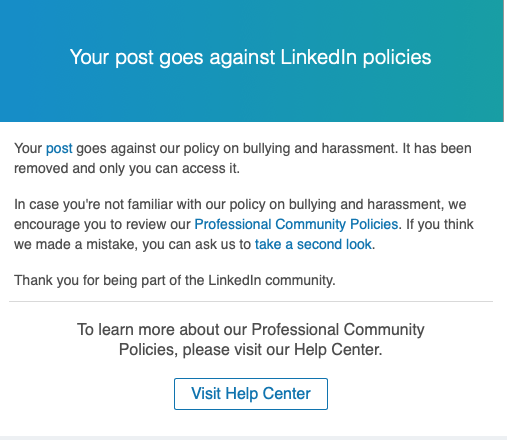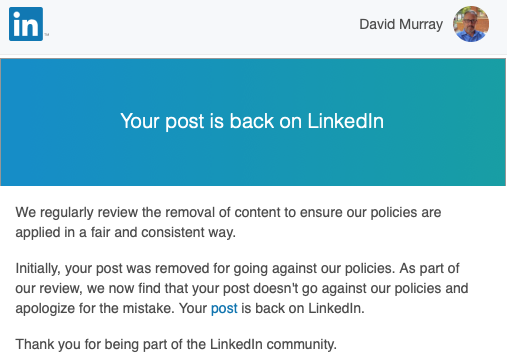When I hear conservatives griping about their posts being eliminated from Facebook for not being politically correct. My sympathy is usually low enough that I worry a gust of air could blow the flame out entirely.
Well, last week I had a piece spiked by LinkedIn.
Got an email from them with the subject line, “A problem with your post.”

That’s all it said. Kind of scary, at first. Like all professional raconteurs (and isn’t that pretty much all of us these days?), I pretty much need LinkedIn to operate.
Also, Kafka-esque. I had been accused and convicted of “bullying and harassment,” though I had awakened that morning intending no such thing!
What on earth had I said?
Except, you know what? I actually had an inkling.
Could it have been that nasty little line in that day’s post about Bill Gates, where I referred to him and other tech CEOs as “spectrum dwellers”?
That’s all I could think of. But I could think of that.
A minute’s detective work revealed that, sure enough: An Australian friend read my piece and agreed with it wholeheartedly. But a friend of his read it and felt otherwise, writing: “There were probably some good points in here. Shame they were all obscured by the use of language like ‘spectrum dwellers’ and so on.” This man’s title? Senior intelligence analyst at the National Disability Insurance Agency.
As Gary Larson once had one dog say to the other in a Far Side cartoon as they puzzled over some missing bones, “It doesn’t take Lassie to figure out what happened here.”
Is it sinister that a complaint by a single obscure bureaucrat in an unknown organization half a world away can file a complaint that results in a writer being accused by a career-crucial communication platform of “bullying and harassment”?
Yes, that is sinister.
Did I sort of have it coming, for taking that shitty little snickering swipe?
Yes, I sort of did. “Yeah, that was low,” my sister said.
And LinkedIn didn’t ban me for life or even threaten that they would. They just hauled down my post, and encouraged me to knock it off.
Which I did, even eliminating the “spectrum-dwelling” reference from the original post.
But I’m not sure how to feel about it at this point. A couple months ago I wrote in favor of “Black LinkedIn,” where people are expressing more candid truths in more colorful ways. In that context, I said I like thought LinkedIn has elements of good global conversation that don’t exist elsewhere in social media: “Social accountability, as LinkedIn profiles can’t be anonymous, and the people you’re debating with are the people whose respect you probably need to maintain if you’re going to have a good career.”
I guess I would have appreciated that senior intelligence analyst just leaving his comment and shaming me in front of my colleagues for my pricky little remark—and let them decide whether it was bullying and harassment or something more or something less. Instead of reporting me to LinkedIn.
But there will always be bitchasses in the world.
But what about LinkedIn?
Look, I understand the mad, dangerous viciousness that Twitter and Facebook have to regulate.
But beyond extreme cases of derangement, can’t LinkedIn rely on professionals to govern one another and themselves, if only out of pure self interest?
Postscript, 12/23

It’s a problem that social platforms are not well equipped to manage. Twitter, in particular, and to a lesser extent Facebook, make money from conflict, “fake news,” bullying, and the cancel culture. Take COVID-19, for example. The platforms have been busy removing posts about all the rumors and general craziness connected to the virus. But what about all of the people, including Dr. Fauci and many in the news media, who said there would never be a vaccine by the end of the year? Do you go back and remove those posts or add warning labels?
Back in 2015, there was a protest aimed at an officer with my company in a foreign country. The protest group posted on Twitter his name, address, phone number, and a bounty on his head — dead or alive. We filed a protest with Twitter, which determined it didn’t violate their community standards. That is, until Twitter’s CEO started receiving death threats on Twitter. Then the community standards changed.
I do think most people could parse the difference between “rumors and general craziness” and Dr. Fauci’s conservative best estimate-a-couple-months-off—but the volume of material to review does seem like a mind-boggling problem, Glynn—even if you assume the platforms are entirely well meaning and willing to do anything in their power to solve the problem short of closing their doors and going fishing.
As a writer of snark, and sardonic editorial— among your other high level, equally admirable but less-known-to-me talents— I have to say, it’s disappointing to see that your wings have been clipped. Your skill with a (ball)pointed instrument puts food on your table.
It makes more sense to see an amateur regulated. Words and commentary are your wheelhouse and you should enjoy wider latitude for your experience. If I had to wager, I’d bet big that Dan Rather has said worse with less consequence.
I hope this doesn’t slow you down.
I’m not worried about it, Bruce. Maybe for a couple of old sailors like us, it’s better to think of it as, in a big storm, my sails are just slightly reefed. We’re still making headway …
Good!! Don’t let the bastards drag you down.
Miss you, brother!
Ironic. My comment is “…awaiting approval by moderator.”
[Approved.]
Well damn. I shared that very post to my LI page yesterday but apparently the outlaw words had already been edited out. I hate to see a sharp pen blunted. I think LI has more to fear from its descent into platitude porn.